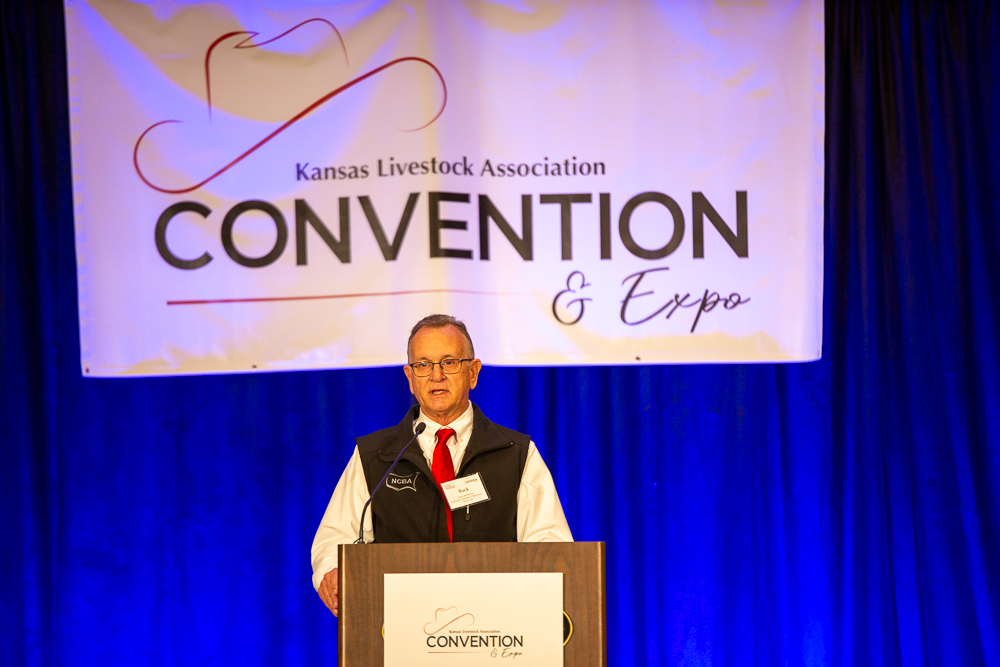Wehrbein praises record crowd at KLA

National Cattlemen’s Beef Association President-elect Buck Wehrbein told attendees at the recent Kansas Livestock Association convention in Manhattan, Kansas, to look back on history as a way to look forward.
World War I closed down many trade routes in the Black Sea region where wheat from Russia and Ukraine made its way to Europe.
“Europe was bleeding,” he said. “And we get involved a little bit later, and our government guaranteed the wheat farmers $2 a bushel if they would grow more wheat, and that was about double what the wheat market was at the time.”
Sod was broken out, and, with ample rains, farmers planted even more wheat. Wehrbein said many believed the climate had changed, and rain was here to stay in Texas, the Oklahoma panhandle and southwest Kansas, he said.
However, the situation changed. The price guarantee ended, and wheat went to 40 cents a bushel, he said.
“Like ag people do, we’ll make up for a bad price with more production.”
More sod was broken out, and then it stopped raining, he said.
During the Dust Bowl, it was estimated an inch of topsoil an hour was leaving and “ending up in Chicago,” he said.
Fast forwarding to the 1960s, 70s and 80s, everyone needed a college education to be better off financially, he said. That led to policies to spur more home ownership, and that encouraged lending institutions to make more money available to purchase houses,” Wehrbein said.
NCBA makes a difference
Wehrbein said that history shows why cattle producers need someone in Washington to look after farmers and ranchers “while we’re out here working daylight to the dark.” He said NCBA is still working on the farm bill.
“We really thought we wouldn’t get a farm bill before the end of the year,” he said. “GT Thompson did a nice job of shepherding it through the House, and (NCBA CEO) Colin Woodall, who’s been watching this for a long time, said it’s the best farm bill he’s ever seen.”
The Senate version is not one Wehrbein is as confident about. A couple of versions have been put out, but they haven’t moved far. Perhaps the Senate will make a push during the lame duck session because Republicans will be the majority party when the new Congress convenes in January, he said.
Wehrbein is pleased with other work NCBA is undertaking, and that includes tax reform.
“You all know better than I, all the asset players with land and businesses and so forth, [if] the estate tax goes back to where it was before, that’s catastrophic,” he said.
Estate taxes were a “signature legislation under President Trump,” he said.
“He wants to do something and maybe even prove it,” he said. “That would be great if it’s even better, but certainly, what we’ve got right now would help a lot.”
Wehrbein touched briefly on animal disease traceability and noted that the new world screwworm is in Guatemala. He also expressed his concerns with a few of President-elect Trump’s Cabinet members, especially Robert Kennedy Jr.
“This guy’s no friend to animal agriculture, and that’s sad that he got nominated, but who knows if he gets confirmed,” he said.
NCBA and Wehrbein are keeping an eye on the endangered species act. He thinks the sage grouse has been talked about for quite some time, and he’s “been hearing about that for my entire life.”
“They’ve got a bunch of new rules that are a mess and have nothing to do with any facts,” he said.
He finished his address by touching on the new dietary guidelines that were released in November and said he’s not impressed with the recommendations for less red meat consumption.
“We will continue to work on that,” he said. “Praise God for the checkoff and all the information that we have.”
The struggle, he said, is having people who are willing to listen.
Wehrbein started in the cattle business as an adult in the 1980s, and he remembers asking his dad “Why does everybody hate us?”
Ranchers were told that red meat was bad fat. Other animal protein made inroads, and Wehrbein said demand was lost. Today, the story has changed because ranchers have listened to their customers about what they want.
Cattle have turned a corner, and yield grades are much higher now, he said. Fifteen years ago, there wasn’t much Choice or Prime. Now it’s around 80%.
For more information about KLA visit www.kla.org.
Kylene Scott can be reached at 620-227-1804 or [email protected].



